- News
The 2023 International Conference on Gynecological Oncology Ability was Successfully Held
https://mp.weixin.qq.com/s/ZGNrY6deW8DifkTnHxNb0A
On December 12, 2023, the 2023 International Conference on Gynecological Oncology Ability was held at Shanghai General Hospital. Professor Shibani Nicum from the Oncology Department of University College London and our gynecological oncology expert team had in-depth exchanges on the development of ovarian cancer and their insights into the diagnosis and treatment of the disease. Professor Wu Sufang, Director of the Clinical Medical Center for Obstetrics and Gynecology of our hospital, presided over the meeting.

Professor Zou Haidong, our Vice President, delivered an opening speech, expressing warm welcome to both the online and offline attendees and looked forward to collaborating with Professor Shibani Nicum on this academic exchange platform, sharing ample ideas with each other.
Professor Wu Sufang then introduced the long history of our hospital as well as the Obstetrics and Gynecology Clinical Medical Center.
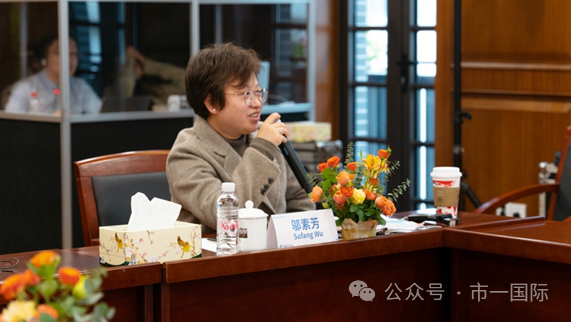
Professor Wu Sufang from Shanghai General Hospital
The Obstetrics and Gynecology Clinical Medical Center of Shanghai General Hospital is one of the earliest disciplines in China to establish an independent gynecological oncology ward. It has a deep foundation and has provided assistance to the development and progress of China's obstetrics and gynecology industry multiple times under the guidance of medical experts, including Professor Lin Yuanying, and has been fully recognized by the industry. After continuous development, the Obstetrics and Gynecology Clinical Medical Center has become a key specialty consisting of multiple sub specialties including gynecological oncology, general gynecology, obstetrics (prenatal diagnosis center), and assisted reproductive medicine. It always provides high-quality medical services to patients with rigorous medical style, exquisite medical technology, and strict scientific management. In addition, the center also refers to the experience and certification standards of DKG in Germany to construct a Comprehensive Cancer Center (CCC), in order to provide better quality full cycle disease management for gynecological cancer patients.
Professor Shibani Nicum shared her insights on the maintenance therapy strategy for newly diagnosed ovarian cancer.
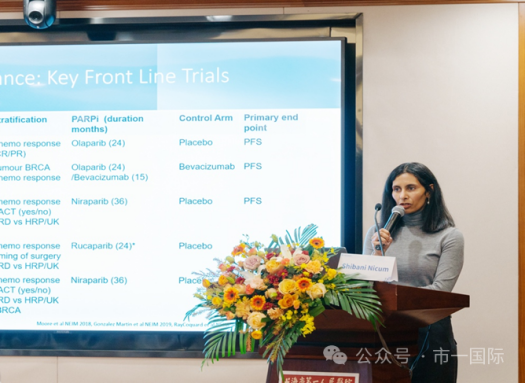
Professor Shibani Nicum, Department of Oncology, University College London
She pointed out that the emergence of PARP inhibitors has brought significant changes to the field of ovarian cancer treatment, shaping a new era of standardized full process management of ovarian cancer through "surgery+chemotherapy+maintenance" therapy. Studies including SOLO1 and PAOLA-1 have confirmed the excellent efficacy and good tolerability of Olapar in first-line treatment of ovarian cancer, bringing widespread benefits to patients; In the era of biomarker guided maintenance therapy, HRD detection is recognized as the cornerstone of implementing precision therapy.
Professor Bao Wei from Shanghai General Hospital gave a lecture based on the clinical practice of standardized diagnosis and treatment of ovarian cancer in the practice.
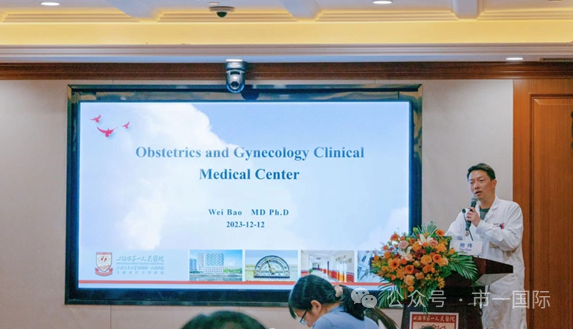
Professor Bao Wei from Shanghai General Hospital
Bao introduced that Shanghai General Hospital’s clinical medical center for obstetrics and gynecology closely follows the international forefront in ovarian cancer management, aligning NCCN guidelines, ASCO and CSCO guidelines in disease diagnosis and treatment management standardization strategies. At the same time, the center also focuses on intervening in CCC management concepts in multiple disease stages of ovarian cancer clinical practice, using multidisciplinary collaboration as a means to not only focus on disease diagnosis and treatment, but also cover the prevention, home care, and follow-up stages of tumor patients.Paying attention to the psychological, social, rehabilitation, and nutritional condition of patients, we provide one-stop high-quality diagnosis and treatment as well as full cycle disease management for ovarian cancer patients. In addition, in the current era of precision treatment, in the precise management of ovarian cancer, the center also attaches great importance to the implementation of postoperative molecular testing for ovarian cancer, in order to further implement precision diagnosis and treatment strategies.
Subsequently, Professor Li Qi from our side gave a wonderful sharing on the management of adverse reactions to PARP inhibitors.
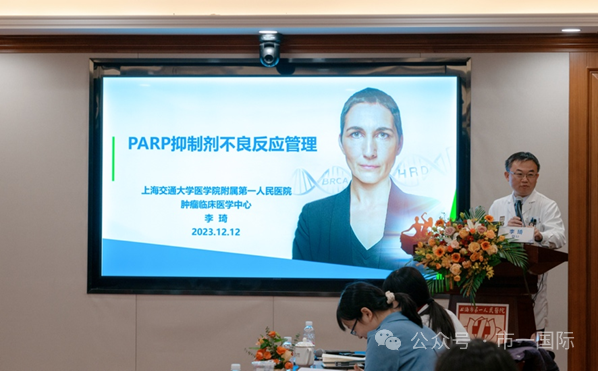
Professor Li Qi from Shanghai General Hospital
Li noted that maintenance therapy fills the treatment window period waiting for disease recurrence after postoperative chemotherapy, emphasizing the importance of maintenance therapy in the full management of ovarian cancer; Furthermore, an inventory of evidence-based studies was conducted, and it was found that compared to Nilaparil, Olaparib as a PARP inhibitor for maintenance therapy had milder overall adverse reactions (with a lower proportion of patients discontinuing medication due to adverse events). A meta-analysis also suggests that compared to Olaparib and Rucaparib, Nilaparib has a higher risk of adverse reactions such as thrombocytopenia, neutropenia, constipation, and headache. Animal studies have also suggested that the lower hematological toxicity of Olaparib may be related to its less distribution in the bone marrow. Afterwards, Professor Li explained in detail the management of adverse reactions to PARP inhibitors based on the CSCO guidelines, and emphasized that good adverse reaction management is the cornerstone of improving patient quality of life. Olaparib has mild overall adverse reactions and is suitable for long-term maintenance treatment.
The case sharing and discussion session kicked off in Dr. Zhang Zhuyuan's presentation on a BRCA wild-type/HRP platinum sensitive recurrent ovarian cancer case, which represents a model of the current treatment status of advanced ovarian cancer in China - the PFS gradually shortened after multi line chemotherapy. Dr. Jin Chengjuan shared a case of platinum sensitive recurrent ovarian cancer with a gBRCA1 mutation, and the two cases complemented each other to demonstrate that the PARP inhibitor treatment regimen can bring greater benefits to HRD positive patients compared to HRD negative patients. Afterwards, under the leadership of Professor Wu Sufang, experts and scholars in the field of ovarian cancer related to Shanghai General Hospital, including Professor Zhu Yaping, Professor Xing Yan, Professor Yuan Lin, and Professor Wang Qingguo, as well as Shibani, participated Professor Nicum had a heated discussion about the details in the diagnosis and treatment of two cases.
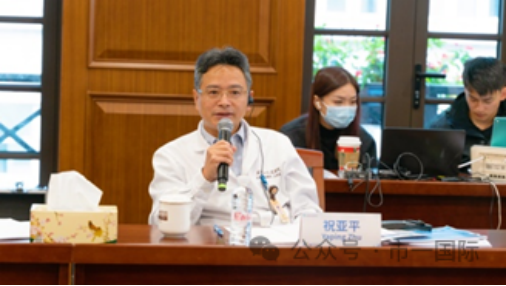
Professor Zhu Yaping from Shanghai General Hospital
Professor Shibani Nicum first analyzed two cases and stated that the first patient achieved good therapeutic effects through the use of PARP inhibitors. Subsequent treatment could consider switching to other PARP inhibitors, combination therapy, or continued observation; For the second platinum sensitive patient, individuals may choose to continue follow-up or receive treatment with PARP inhibitors. Subsequently, Professor Zhu Yaping stated that surgery is still the first choice for clinical treatment, with over 80% of patients choosing surgical resection for initial treatment. Shibani Professor Nicum further added that although the goal of surgery is to achieve R0 resection, not all patients can undergo satisfactory tumor cell reduction surgery. However, for patients who have been assessed as unable to undergo satisfactory tumor cell reduction surgery, if surgery is not performed, excessive tumor burden can affect their survival and quality of life. Therefore, she believes that although R0 resection should be the pursuit of clinical doctors, in some cases, we can also allow or accept non R0 resection, especially in frontline or frontline treatment. In the later treatment, or for patients with recurrent ovarian cancer, if R0 resection cannot be achieved, the patient's benefits will be quite limited. The better treatment options for this group are chemotherapy and maintenance therapy.

Professor Wu Sufang believes that for first-time surgical patients, the treatment goal is still recommended to focus on achieving R0 resection. Compared to "accepting" non R0 resection, it may be more important for patients to choose a suitable hospital and strive for R0 resection with the efforts of the MDT team. In the posterior treatment, if R0 resection cannot be achieved, the status of drug therapy becomes more prominent. Meanwhile, Professor Wu Sufang emphasized the importance of clinical evaluation.
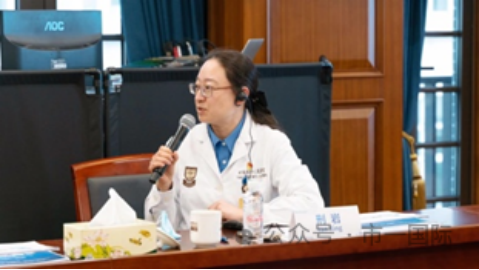
Professor Xing Yan from the Department of Nuclear Medicine of Shanghai General Hospital
Professor Xing Yan, as an expert in nuclear medicine, elaborated on the application of PET-CT and PET-MR in clinical practice and expressed the hope of conducting more clinical research in this area with experts in the future. Professor Wang Qingguo, a radiology expert, pointed out that CT imaging can reveal morphological changes and has a higher detection rate for peritoneal lesions than PET-CT. For gynecological tumors, magnetic resonance imaging is very important. It is recommended that patients undergo preoperative magnetic resonance imaging to assist in clinical staging diagnosis. Professor Yuan Lin, a pathology expert, pointed out that it is common in clinical practice for patients to experience changes in molecular pathology test results after receiving treatment. Currently, it is mainly believed to be due to tumor heterogeneity or clone screening. In addition, with the continuous optimization of genetic testing technology, the number of people who can benefit from PARP inhibitors may increase.
When it comes to the value of detecting minimal residual disease (MRD) in patients prone to recurrence, Professor Wu Sufang pointed out that comprehensive and accurate clinical evaluation is of great significance for guiding clinical treatment and conducting clinical research. In clinical practice, it is possible to communicate with patients in advance about the reasons for MRD testing to alleviate their anxiety. Professor Zhu Yaping raised the question of whether maintenance therapy is necessary when MRD testing is negative. Regarding this, Professor Shibani Nicum responded by stating that although there is currently no evidence to suggest that MRD test results can be used to guide clinical medication, he looks forward to continuous and in-depth exploration by the academic community in this field in the future.
Both domestic and foreign experts unanimously agree that maintenance therapy represented by PARP inhibitors has effectively filled the "treatment window" waiting for disease recurrence after postoperative chemotherapy, bringing significant changes to the field of ovarian cancer treatment; At the same time, it also emphasizes the importance of HRD detection in precision therapy in the era of biomarker guided maintenance therapy; On the other hand, good adverse reaction management is the cornerstone of improving the quality of life of patients. Different PARP inhibitors have different adverse reaction spectra, and overall, Olaparib has mild adverse reactions, making it the optimal choice for long-term maintenance treatment of PARP inhibitors.
Gynecological tumors, represented by the ovaries, pose a major threat to women's health in China. On this academic exchange platform between China and foreign countries, many experts and scholars in the field of ovarian cancer from our hospiatal collaborated with Professor Shibani Nicum delved into the heavyweight research achievements in the field of gynecological oncology, shared academic insights and clinical experience, and worked together to promote the development and optimization of ovarian cancer diagnosis and treatment. Professor Shibani Nicum was deeply impressed by the profound foundation of the Obstetrics and Gynecology Clinical Medical Center of Shanghai General Hospital, as well as the team's continuous innovation and exploration while inheriting excellent traditions. Both sides stated that they will continue to cooperate and work together to promote the development of ovarian cancer diagnosis and treatment.
